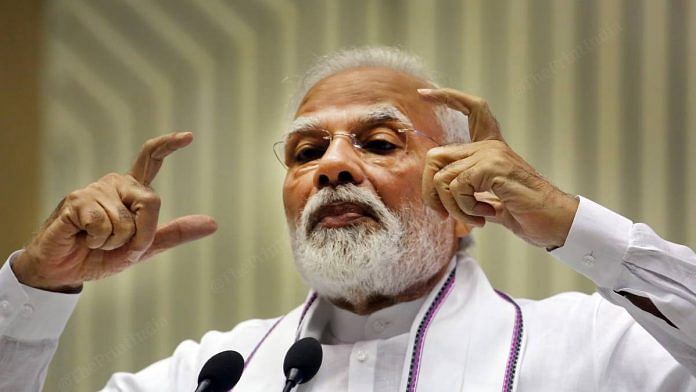The two-part BBC documentary, India: The Modi Question, through claims of having investigated certain (missing) aspects related to the 2002 Gujarat riots, has tried to project the riots and then-chief minister in a poor light. Reacting quickly, the Ministry of External Affairs has trashed the documentary as a “propaganda piece” that lacked objectivity and reflected a “colonial mindset”. The central government has also clamped down on it with a ban and asked social media platforms to remove videos and website links to the film.
While the government’s move to ban the documentary has been criticised by the opposition, especially the Congress and Trinamool Congress (TMC), the government has received support from unexpected quarters. Congress veteran and former Defence Minister A. K. Antony’s son Anil Antony has slammed those using the BBC documentary as a stick to beat the BJP with. A day after his social media post on the documentary, he resigned from the party alleging “intolerant calls to retract a tweet”.
The Modi Question raises more questions than it seeks to answer. Going by the content, intent and the timing of the documentary, the BBC seems to be rushing on a path where angels would fear to tread. According to the channel, the first part reportedly tracks Modi’s ascendancy to power in Gujarat and the 2002 riots. If the BBC had obtained previously unpublished reports from the British Foreign Office as it claims, more serious questions arise on the nature of the documents and the timing and manner in which they have been publicised. The 2002 riots were investigated by a Special Investigation Team followed by the Supreme Court upholding its closure report. This was one case which must have been subjected to maximum media trial and extremely politicised. It is difficult to believe that the then-UPA government led by the Congress would have left any stone unturned to prove that then-Gujarat CM was the prime culprit and hence be sent to the gallows. The Supreme Court finally found no evidence to pronounce Modi guilty and the case was closed.
If the British Foreign Office had some authentic documents which would have helped the Supreme Court do proper justice, as the BBC claims, why did the British authorities not inform the Government of India about it? Why did the British Foreign Office choose to hand over these ‘important’ documents to the BBC after almost ten years of the closure of the case? Do these two institutions still believe that they are above the Supreme Court of India and that they can reopen the case as if ‘India that is Bharat’ is still under Her Majesty’s Government?
Also read: BBC Modi documentary row highlights highly risky nature of India’s new image wars
Who gains from it?
The Godhra incident of 59 karsevaks returning from Ayodhya being incinerated in the train compartment was the primary cause of major riots in 2002. All aspects of the riot including the role of the state government were thoroughly scrutinised by the Supreme Court-constituted SIT. The wrongdoers were punished and some of them are still in jail. The accusations of dithering, inaction and even complicity in the riots by the state government were probed by the SIT and found to be lacking evidence and couldn’t be established. In the subsequent years, the ruling Congress continued to target the BJP and particularly Modi in order to revive the allegations but to no avail.
Subsequent election victories of the BJP in the state and the resounding victory of Modi in 2014 clearly nailed the canard spread about the riots, which were aimed to pitch the Muslim vote bank against that of Hindus. This did not work and is not expected to work anymore as the people’s mindset appears to have changed. Even the majority of the Muslim voters do not buy the minority card and prefer to vote for development and progress. The opinion of the Vice Chancellor of the Aligarh Muslim University (AMU) Tariq Mansoor sums up the thinking of the Muslim mind: “Muslims in India have confidence in the Constitution, the executive, legislature and courts that their issues will be addressed. We want to move on from the past — we do not live there anymore. We are looking ahead and are doing so with hope as well as anticipation. For Indian Muslims, Modi is not a question, but Modi is the answer that is undoing many of the injustices against us.”
Much water has flown down the Sabarmati. Several elections have been fought and won, and some lost by the BJP relegating the communal issue to the background. It is unclear as to why anyone in the Indian political milieu would want to revive this issue unless there is a political game-plan to create fissures among communities and vitiate the atmosphere.
The BBC had aired a documentary The Princes and the Press highlighting fissures in the Royal Family and describing how its members dealt with the media. The British Royal Family issued, what is considered very rare, a joint statement saying, “A free, responsible and open press is of vital importance to a healthy democracy. However, too often it is overblown and unfounded claims from unnamed sources that are presented as facts and it is disappointing when anyone, including the BBC, gives them credibility”.
The BBC should worry about its credibility and not dish out agenda-driven programmes and news.
Seshadri Chari is the former editor of ‘Organiser’. He tweets @seshadrichari. Views are personal.
(Edited by Prashant)



